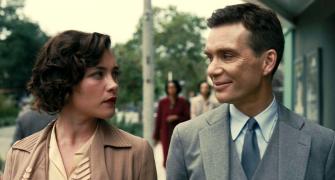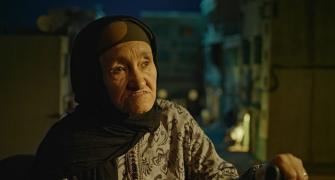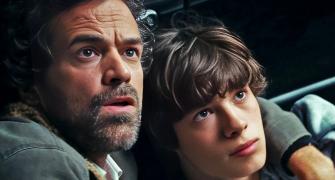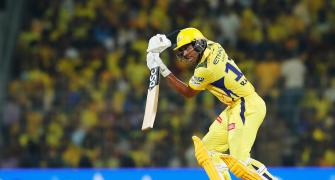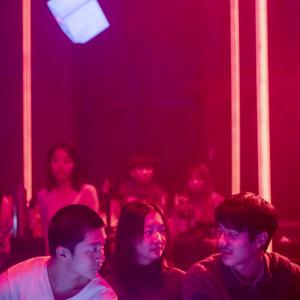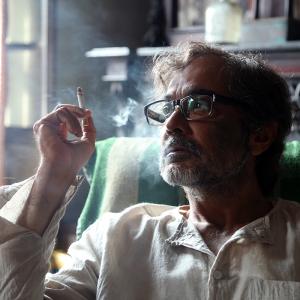'This was a film, a story that had never been told before.'

For the last four-and-a-half decades German film-maker Wim Wenders has been making compassionate films -- narratives and documentaries set around the world, including, of course, in his own country. His work has taken him to most of the continents in the world.
Often, the soul of his films is inspired by the works of the Japanese master Yasujirō Ozu.
Wenders has referred to Ozu's films as 'the sacred treasure of cinema'.
In the early 1980s, he traveled to Japan to make a documentary (Tokyo-ga) on the Tokyo he saw in the Japanese master's works.
His latest film Perfect Days has been nominated for an Oscar in the Best International Feature category.
Wenders travels once again to Tokyo to narrate the story of a middle-aged man who cleans some of the most beautiful toilets in the city and is basically content with his quiet, sparse life.
Perfect Days stars the Japanese actor Koji Yakusho (Shall We Dance, 13 Assassins), who won the Best Actor award for the film at last year's Cannes film festival.
Rediff.com's Senior Contributor Aseem Chhabra spoke to Wenders and Yakusho about their collaboration, working together even when they do not speak each other's language.
Let me start by thanking you about something, Wim. Just as you were inspired by Ozu's films and you visited Tokyo to shoot Tokyo-ga, when I saw Buena Vista Social Club, I was so moved by the beauty of Cuba that I took a trip to Havana. You made my trip to Havana possible.
Wim Wenders: Well, I take full responsibility and am happy you did it because you saw Havana at a good time.
I was there in 2006. Fidel Castro was still alive.
Perfect Days is my favourite film from last year. I understand that the film is a tribute to Ozu. But Tokyo has changed so much since Ozu was making films.
How did you find that Zen-like sense that you discovered in Ozu's films, and also the idea of a character Hirayama?
Wim Wenders: I didn't really try to make a film in the tradition of Ozu. If anything, I liked the spirit of his films, but we made a very contemporary film.
It was shot on digital and it was today's Tokyo, 60 years after Ozu died. But we thought we can keep the spirit of Ozu alive and that's one of the reasons why the character is called Hirayama.
The film evolved because I was invited to look at these beautiful toilets. I wouldn't have gone to Tokyo just to look at toilets. But these were built by 15 contemporary architects who normally build banks, museums and high rises. And now they have built something very small: Toilets. I liked the idea.
It was an open invitation and any excuse to go to Tokyo was fine.
They said, if I was interested, we could talk about a series of short documentaries on the architects and their creations.
I went to Tokyo, and loved these toilets. But I felt there was a much bigger story behind the toilets. Instead of making four short documentaries, they would give me four days for each of them, I said to the producers, in a similar amount of time, I could tell a real story.
And these toilets can, of course, appear. This is a public project, which is the Tokyo Toilet Project. I thought I could tell a bigger story about the sense of the common good, which I felt was alive in Tokyo, the love for small things, for beauty, the dedication to craft and all these things that I love so much about Japan.
It would have as the central character: The caretaker, a caretaker for these times. But just when I thought I talked myself out of the job, they said, 'We think it can be done. In 16 days, we can make a movie.' And I said 'Yes, of course, all we need is a script and a great actor.'
We got the script done and we actually wrote it for Koji. In fact, Koji accepted to be in it before there was a script.

I have been to Japan a few times and I find Kyoto to be a beautiful city, very calm and peaceful. But in Tokyo, there is so much noise, traffic, tall buildings, lights and people walking in Shibuya. Yet, you were able to find this sense of calmness in the city. How did you do that? I suppose it is a part of Japanese culture.
Wim Wenders: I think it's permanently present in Japanese culture. There is a very contemplative part of Japanese culture which is represented in haiku (a short Japanese poetic form). Then their love for small things like komorebi (light filtered through the leaves of trees) and a heightened sense of responsibility towards society.
But I thought about something that would make sense today: How do we live?
We had just lived through a pandemic, all of us. The film was about a little different kind of living, and attitude and approach to who we are. Because most of us came out of the pandemic even more confused than before.
I figured Tokyo was the right location for the film, a perfect place to reflect the light on a different kind of life. Hirayama becomes a projection of almost a Utopian character but part of him is very real.
But we all need a little piece of utopia in our life to live up to something. So Takuma Takasaki, my Japanese co-writer, and I invented this character. Once Koji said yes, that made the whole thing so much easier.
Koji, I have seen you in many films from Shall We Dance, which was a huge hit and made into Hollywood film, 13 Assassins, and I loved you in Under the Open Sky. But this is such a quiet role. Hirayama barely says anything.
Why were you drawn to this character? Were you okay with the fact that you basically had nothing to speak? That you essentially spoke with your beautiful face, your smile and your eyes?
Koji Yakusho: When I chose to become involved in this project, all I knew that it was about a toilet cleaner. And that Wim Wenders was the director. There was no script.
I felt that this was a film, a story that had never been told before. When I read the completed script, I felt that it would not be a commercial film.
But it was the sort of a film that I would want to see as an audience member. I never in my wildest dreams thought of working with Wim Wenders.

Koji, actors do different kinds of roles. But you are also a big, successful star. How did you approach this simple man's life who has virtually achieved nirvana as he is living. How did it inspire you?
Koji Yakusho: In this script, there are so many parts that aren't written. That really prompts the imagination of the film's audience. I felt despite the fact that there are no lines, the story comes through magically.
As an actor, I like to bear the weight of the past of the character on my shoulders. So it was really interesting as an actor since I had my own idea of Hirayama's past, but I also received a memo from Wim Wenders.
It gave me a clear trajectory that this is the correct way to tell the story.
I had never filmed a film in this way, so it was an extremely stimulating and creative experience. It was different from any other project I had worked on and I felt a lot of freedom on set.
Talking about the set, how did you two work together when you don't speak each other's languages? Did you start to look at each other's faces and facial expressions? I understand, people get familiar with each other.
Wim Wenders: We had a translator on the set, but the poor woman didn't have much to do because we managed to work with sign language and looks. I am not a director who shows the actor what to do. It was all in the script.
Koji has so much experience that I didn't have to interfere.
Sometimes, it is best for director to be modest and pay attention to what the actor offers. He became so much of Hirayama that we even started to shoot the rehearsals, instead of rehearsing and then shooting.
For instance, we had shot several days of his life and Hirayama has his first day off. The script said he's cleaning his apartment.
I didn't know how one would clean the tiny apartment. I asked, 'Koji, what do we do here?'
He said, 'I am going to show you something. You can shoot anyway. All I need is a bucket of water and an old newspaper.'
We started shooting. He came up the stairs, put the newspaper in the water, crumpled it and threw little pieces everywhere in the room. Then he took his brush, brushed these wet pieces around and put them in another bucket. Even the Japanese members of the crew didn't know what he was doing.
But he said, 'That's how my grandmother would clean tiny rooms.'
It made so much sense because wet newspapers just pick up all the dust. I think everybody in the crew is now doing this.

Koji, how did you communicate and figure out how to do things without being able to speak to Wim?
Koji Yakusho: In the beginning, I was a little worried with the idea of working with a director I couldn't communicate with directly. And we started shooting without rehearsals. When that became the case, I knew that I could reference the script, and I knew that our camera person, Franz (Lustig) would just follow.
We continued for days and I was able to stay in character as Hirayama for a very long time. There wasn't a lot in the script in terms of laughter or moments where he laughs or gets angry.
But Wim would say, 'It's morning, he wakes up, comes out, looks at the sun and he smiles.'
Or when Hirayama's colleague quits unexpectedly, he told me to be the most angry in the entire film.
I thought to myself does Hirayama really get angry? When the film was completed, I watched it and I found that these emotions allowed Hirayama to be a more relatable character, rather than kind of a monk in training.
Wim, can you give me give me a sense about Hirayama's dreams? What did you try to indicate through those dreams?
We wrote these dreams into the script, just as we wrote the music, the songs, because I felt it would tell a lot about his character.
The dreams were remnants of his days, little flashes of things he noticed sometimes from the corner of his eye, as he liked the light and trees so much, and he tried to capture that in photographs.
Those were important moments of his days. His dreams show a lot of what matters to him, even if it's not in the story.
I felt these little flashes of the day would always round up the day and would show in a beautiful silent way, who he is.
We had a fast schedule, so we couldn't possibly shoot these dreams as well. I had a perfect second unit which was basically my wife (Donata) and a Japanese woman location manager. The dreams were shot by this two-women crew.
Sometimes, they were on the set to catch something that happened in the day and sometimes they were on their own, catching komorebi, the trees, the reflections and everything that mattered to Hirayama.
My wife is normally on the set and does still photography. But on this film, I didn't want to have still photography because it takes time away from the shoot. So we had the ideal project for her and she did a beautiful job with the dreams. She even edited the dreams on our own.
We inserted them because I felt they were perfect little works of art and they should remain the way she envisioned them.


